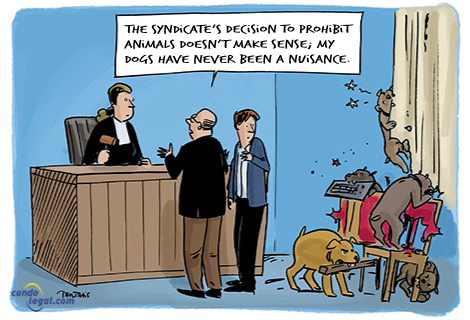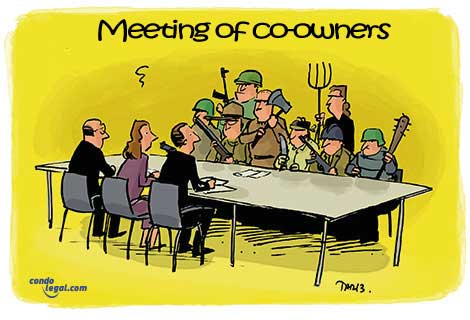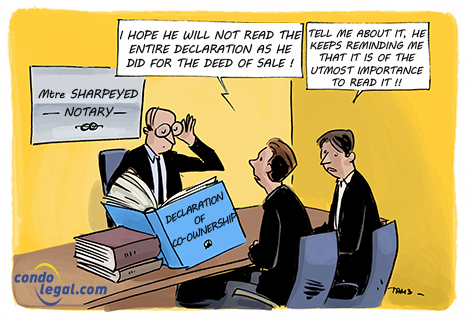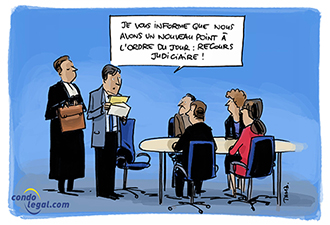Canceling a decision of the meeting of the co-owners

The co-owners have a
legal proceeding when they oppose decisions taken by the
meeting of the co-owners. They generally seek to contest decisions they consider unjustified. In order to promote the stability of the decisions made at the meeting of co-owners, the legislator allows such recourse only in certain circumstances. Thus, article
1103 of the Civil Code of Québec provides that any co-owner may apply to the court to annul or, exceptionally, to amend a decision of the general meeting if the decision is biased, if it was taken with the intent to injure the co-owners or in contempt of their rights, or if an error was made in counting the votes.
Grounds for Annulment or Modification
A co-owner could initiate a legal recourse to sanction excesses by the majority of co-owners or to request the annulment of a decision taken by a meeting of co-owners. The causes allowing the intervention of the court are as follows:
Bias in a Decision
A resolution (decision) voted or rejected at a meeting of co-owners is considered biased when it is taken in disregard of fairness, objectivity or the collective interest, for example it unduly favors or disadvantages one or more co-owners. This type of decision qualified, as the case may be, as an "abuse of majority" or "abuse of minority" may thus be sanctioned when only a limited number of co-owners benefit from it, while no objective element can justify it.
Intent to Injure the Co-Owners
In law, intent to injure constitutes the highest level of fault that may be attributed to co-owners at a meeting, because it carries a connotation of bad faith. It consists, for the general meeting of co-owners, in using its rights without benefit to the syndicate and with intent to injure the individual rights of the co-owners or, at the very least, for a purpose contrary to the collective interest.
Disregard for the Rights of Co-Owners
The terms "in contempt of their rights" cover a wide range of cases. The following is a non-exhaustive list:
However, a high level of formality surrounding certain procedural rules could lead to a proliferation of appeals for annulment of meeting decisions. Therefore it is up to the court to assess the consequences of a procedural defect on the expression of the vote cast by the majority.
Error in Counting the Votes
In counting the votes, the rule set out in Article 1090 of the Civil Code of Québec must be taken into account, which article stipulates that "Each co-owner is entitled to a number of votes at a general meeting proportionate to the relative value of his fraction." This number of votes is related to the share of the right of ownership he holds in the immovable. In addition, it should be noted that certain specific rules provided for in the Civil Code of Québec are intended to mitigate this general principle. Thus, a decision may be vitiated if it does not consider:
However, it should be noted that an error which does not result in any change in the count of the majorities required for the adoption of a resolution of the meeting will not result in the annulment of the decision or its amendment.
Recourse and Competent Tribunal
An application for annulment or modification constitutes the judicial recourse to declare a decision taken by the general meeting of co-owners null and void or to have it modified. It will be handled by a judge of the Superior Court of Quebec. Such proceedings must be prepared and filed in court by any co-owner who suffers prejudice or by his lawyer. It is up to the co-owner to prove his claim.
Power of the Tribunal to Intervene
The tribunal may now not only annul, but also, exceptionally, modify a decision of the general meeting of co-owners which was taken with the intention to harm the co-owners or disregard their rights, or if an error occurred in the counting of the votes. However, this power should be exercised with prudence and parsimony. The judge could therefore only exercise marginal control and could not substitute his own assessment of the appropriateness of the decision taken by the co-owners at the meeting. It is only in cases of manifest error (e.g. a wrong vote count has resulted in the rejection of a resolution that should have been adopted, but for this error) or a decision deemed abusive that the judge may substitute his own assessment for that of the general meeting of co-owners as to the appropriateness of a decision.
Deadlines to Act
An application for the annulment of a decision of a meeting must, under forfeiture, be instituted within 90 days of the date of the meeting. Specifically, this period shall begin to run from the day after the day of the meeting of co-owners. Once the time limit has expired, it is no longer possible to challenge a decision (resolution), even if it is unlawful or grounds for challenge come to light at a later date, including as a defence. Thus a manifestly irregular decision will become in a way regular, and will be applicable to all.
Limitations on Recourse
The recourse provided for in Article 1103 of the Civil Code of Quebec does not authorize a co-owner to question the merits of a decision of the general meeting of co-owners; rather, it is intended to remedy the situations provided for in this article. It is useless to take legal action against the syndicate when a decision is taken without taking into account the voting rights of a co-owner, since these rights, if they had been properly counted, would not have changed the outcome of the deliberation. In addition, the legal action for annulment of a resolution of a meeting of co-owners does not suspend its execution. In other words, decisions are enforceable in principle as soon as a resolution is adopted by the meeting of co-owners.
Risk Associated with Recourse
The third paragraph of Article 1103 of the Civil Code of Quebec allows the tribunal, when it rejects such an action, to order the co-owner-plaintiff to pay damages if it deems that the action was futile or vexatious. If the tribunal concludes that the recourse undertaken by the co-owner constitutes a flagrant case of abusive procedure, the co-owner may have to compensate the syndicate. In addition to court costs, the co-owner may be required to pay damages to compensate the syndicate for the prejudice it has suffered, including extra-judicial fees and disbursements incurred by the syndicate or, if the circumstances justify it, punitive damages.
 WHAT YOU SHOULD KNOW! A purely material error in the drafting of the minutes does not affect the validity of the decisions taken at the meeting of co-owners, if it does not affect the votes, the results of which have been correctly transcribed.
WHAT YOU SHOULD KNOW! A purely material error in the drafting of the minutes does not affect the validity of the decisions taken at the meeting of co-owners, if it does not affect the votes, the results of which have been correctly transcribed.
 WHAT TO KEEP IN MIND: A simple formal notice is insufficient. Opposing a voted decision can only be made by filing legal proceedings within 90 days of the date of the meeting. After this period, even a decision that is manifestly irregular will in some way become lawful and applicable to all.
WHAT TO KEEP IN MIND: A simple formal notice is insufficient. Opposing a voted decision can only be made by filing legal proceedings within 90 days of the date of the meeting. After this period, even a decision that is manifestly irregular will in some way become lawful and applicable to all.
 WARNING! The syndicate may introduce a cross-application (a defence) against the action of the co-owner if his action is futile and vexatious. It may then claim damages.
WARNING! The syndicate may introduce a cross-application (a defence) against the action of the co-owner if his action is futile and vexatious. It may then claim damages.
Back to the factsheets





